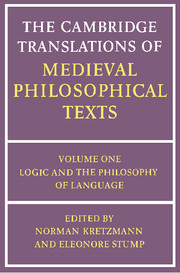Book contents
- Frontmatter
- Contents
- Preface
- General Introduction
- 1 BOETHIUS: On Division
- 2 Anonymous: Abbreviatio Montana
- 3 PETER OF SPAIN Predicables Categories
- 4 LAMBERT OF AUXERRE: Properties of Terms
- 5 Anonymous: Syncategoremata Monacensia
- 6 NICHOLAS OF PARIS: Syncategoremata (selections)
- 7 PETER OF SPAIN: Syllogisms; Topics; Fallacies (selections)
- 8 ROBERT KILWARDBY: The Nature of Logic; Dialectic and Demonstration
- 9 WALTER BURLEY: Consequences
- 10 WILLIAM OCKHAM: Modal Consequences
- 11 ALBERT OF SAXONY: Insolubles
- 12 WALTER BURLEY: Obligations (selections)
- 13 WILLIAM HEYTESBURY: The Compounded and Divided Senses
- 14 WILLIAM HEYTESBURY: The Verbs ‘Know’ and ‘Doubt’
- 15 BOETHIUS OF DACIA: The Sophisma ‘Every Man is of Necessity an Animal’
- Index
7 - PETER OF SPAIN: Syllogisms; Topics; Fallacies (selections)
Published online by Cambridge University Press: 05 June 2012
- Frontmatter
- Contents
- Preface
- General Introduction
- 1 BOETHIUS: On Division
- 2 Anonymous: Abbreviatio Montana
- 3 PETER OF SPAIN Predicables Categories
- 4 LAMBERT OF AUXERRE: Properties of Terms
- 5 Anonymous: Syncategoremata Monacensia
- 6 NICHOLAS OF PARIS: Syncategoremata (selections)
- 7 PETER OF SPAIN: Syllogisms; Topics; Fallacies (selections)
- 8 ROBERT KILWARDBY: The Nature of Logic; Dialectic and Demonstration
- 9 WALTER BURLEY: Consequences
- 10 WILLIAM OCKHAM: Modal Consequences
- 11 ALBERT OF SAXONY: Insolubles
- 12 WALTER BURLEY: Obligations (selections)
- 13 WILLIAM HEYTESBURY: The Compounded and Divided Senses
- 14 WILLIAM HEYTESBURY: The Verbs ‘Know’ and ‘Doubt’
- 15 BOETHIUS OF DACIA: The Sophisma ‘Every Man is of Necessity an Animal’
- Index
Summary
Introduction
(For information on Peter's life and writings, see the introduction to Translation 3.)
The following three selections are taken from Peter of Spain's Tractatus, tractates IV, V, and VII; they are representative of treatments of this material among thirteenth-century terminist logicians.
The selection on syllogisms begins with standard definitions of technical terms. After presenting the basic Aristotelian lore regarding the valid syllogisms in all three figures, Peter ends with a brief discussion of Aristotle's remarks on useless quasi-syllogistic combinations.
For further reading on the relation between Aristotelian and medieval logic, see CHLMP III.4, ‘Ancient Scholastic Logic as the Source of Medieval Scholastic Logic.’
The medieval tradition of the Topics has its source in Aristotle's Topics. But the most important source for scholastic work on Topics is Boethius, who understands two different sorts of things as Topics: first, self-evidently true, universal generalizations; and second, the general headings under which maximal propositions may be classified.
Peter of Spain, whose work on Topics stands in the Boethian tradition, tries to combine the traditional views of Topics with Aristotelian syllogistic. A Topical argument is an enthymeme, as he sees it, and the function of the Topic is to confirm the validity of such enthymemes.
For further reading on the Topics, see CHLMP V.14, ‘Topics: their Development and Absorption into Consequences.’
From Aristotle's Sophistici Elenchi medieval philosophers took the view that there are six fallacies whose deceptive appearance of validity is dependent on language in some way, and seven whose appearance of validity depends on something other than language.
- Type
- Chapter
- Information
- The Cambridge Translations of Medieval Philosophical Texts , pp. 216 - 261Publisher: Cambridge University PressPrint publication year: 1989

